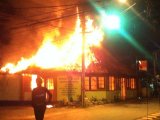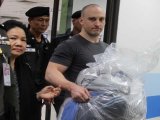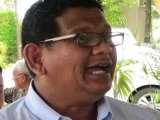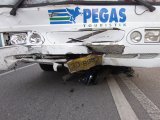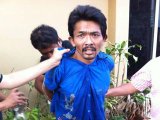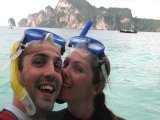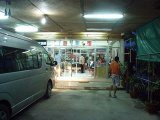PHUKET: The government of Burma should promptly and impartially investigate alleged excessive force by local authorities against peaceful anti-copper mine protesters, Human Rights Watch said today.
On November 29, 2012, in Monywa, Sagaing Division, local security forces forcibly dispersed six protest camps at the Letpaudaung copper mine, arrested an unknown number of protesters, and injured at least 40, including many with serious burns.
Witnesses told Human Rights Watch that security forces involved in the early morning raid on the camps used tear gas, smoke bombs, and fire against protesters, including Buddhist monks and farmers, who had been camped out for several days.
A government information team issued a statement that day saying that local authorities had used riot-control measures, but denied the use of excessive force.
Several hours later, President Thein Sein's office issued a one-line statement withdrawing the previous statement but providing no further explanation.
''A hospital ward full of horribly burned Buddhist monks and other protesters deserve to know who attacked them while they were sleeping and what the government is going to do about it,'' said Phil Robertson, deputy Asia director at Human Rights Watch.
''The crackdown at the Letpadaung mine is a fundamental test case for the government's commitment to peaceful assembly and willingness to demand accountability for abuses.''
Public protests against the Letpadaung mine, which affects at least 26 villages, have increased in the past year.
''We submitted an application 11 times but it was never approved,'' said a local protest leader describing previous efforts to organise a protest in the town of Monywa.
''Finally they said the protest would impact badly on the people of Monywa.''
They decided to exercise their human right to peaceful assembly and proceed anyway near the mine site.
The Letpadaung copper mine, owned by the Union of Myanmar Economic Holdings, a Burmese military conglomerate, and Wanbao Mining, a subsidiary of Chinese industrial and arms manufacturer China North Industries Corporation (Norinco), has long been controversial.
Villagers at the nearby Sabetaung and Kyisintaung mines - collectively known as the Monywa Copper Project, from which Letpadaung is an expansion - told Human Rights Watch that for many years they have had health problems from air, soil, and water contamination they believe are the result of mining processes.
Many at the old mine sites also allege their land was confiscated without compensation.
''The government's response to the Letpadaung crackdown will be crucial for determining whether military-invested projects still operate above the law in Burma,'' Robertson said.
The authorities should promptly charge those arrested with a recognised offense or release them, Human Rights Watch said. Detainees should be provided immediate access to lawyers, medical care, and family members.
A government information team issued a strongly-worded statement saying that local authorities used riot-control measures but denied the use of excessive force.
Several hours later, however, the office of President Thein Sein issued a one-line statement withdrawing the previous statement but providing no further explanation.
Villagers from the Letpadaung site told Human Rights Watch their concerns are in part due to the negative experiences of the villagers living in the vicinity of the other copper deposits in the area.
Human Rights Watch said the government should investigate and prosecute as appropriate anyone responsible for the excessive use of force.
The Universal Declaration of Human Rights, widely regarded as reflective of customary international law, guarantees the right to peaceful assembly.
The United Nations Basic Principles on the Use of Force and Firearms by Law Enforcement Officials provides that officials acting in a law enforcement capacity ''shall, as far as possible, apply non-violent means before resorting to the use of force.''
Whenever the use of force is unavoidable, security forces shall ''[e]xercise restraint in such use and act in proportion to the seriousness of the offence and the legitimate objective to be achieved.''
Opposition leader and National League for Democracy leader Aung San Suu Kyi visited Monywa immediately following the crackdown and told protesters that she would seek to negotiate a solution between the mine operators and affected local communities.
Human Rights Watch said Suu Kyi should also press the government to hold accountable those who used excessive force.
''The government should recognise that local voices are essential to an open society, whether in criticizing new laws or the state's use of natural resources,'' Robertson said.
''This assault against peaceful protesters raises serious concerns about the failure of the government to protect rights when state or military interests are at stake.''
On November 29, 2012, in Monywa, Sagaing Division, local security forces forcibly dispersed six protest camps at the Letpaudaung copper mine, arrested an unknown number of protesters, and injured at least 40, including many with serious burns.
Witnesses told Human Rights Watch that security forces involved in the early morning raid on the camps used tear gas, smoke bombs, and fire against protesters, including Buddhist monks and farmers, who had been camped out for several days.
A government information team issued a statement that day saying that local authorities had used riot-control measures, but denied the use of excessive force.
Several hours later, President Thein Sein's office issued a one-line statement withdrawing the previous statement but providing no further explanation.
''A hospital ward full of horribly burned Buddhist monks and other protesters deserve to know who attacked them while they were sleeping and what the government is going to do about it,'' said Phil Robertson, deputy Asia director at Human Rights Watch.
''The crackdown at the Letpadaung mine is a fundamental test case for the government's commitment to peaceful assembly and willingness to demand accountability for abuses.''
Public protests against the Letpadaung mine, which affects at least 26 villages, have increased in the past year.
''We submitted an application 11 times but it was never approved,'' said a local protest leader describing previous efforts to organise a protest in the town of Monywa.
''Finally they said the protest would impact badly on the people of Monywa.''
They decided to exercise their human right to peaceful assembly and proceed anyway near the mine site.
The Letpadaung copper mine, owned by the Union of Myanmar Economic Holdings, a Burmese military conglomerate, and Wanbao Mining, a subsidiary of Chinese industrial and arms manufacturer China North Industries Corporation (Norinco), has long been controversial.
Villagers at the nearby Sabetaung and Kyisintaung mines - collectively known as the Monywa Copper Project, from which Letpadaung is an expansion - told Human Rights Watch that for many years they have had health problems from air, soil, and water contamination they believe are the result of mining processes.
Many at the old mine sites also allege their land was confiscated without compensation.
''The government's response to the Letpadaung crackdown will be crucial for determining whether military-invested projects still operate above the law in Burma,'' Robertson said.
The authorities should promptly charge those arrested with a recognised offense or release them, Human Rights Watch said. Detainees should be provided immediate access to lawyers, medical care, and family members.
A government information team issued a strongly-worded statement saying that local authorities used riot-control measures but denied the use of excessive force.
Several hours later, however, the office of President Thein Sein issued a one-line statement withdrawing the previous statement but providing no further explanation.
Villagers from the Letpadaung site told Human Rights Watch their concerns are in part due to the negative experiences of the villagers living in the vicinity of the other copper deposits in the area.
Human Rights Watch said the government should investigate and prosecute as appropriate anyone responsible for the excessive use of force.
The Universal Declaration of Human Rights, widely regarded as reflective of customary international law, guarantees the right to peaceful assembly.
The United Nations Basic Principles on the Use of Force and Firearms by Law Enforcement Officials provides that officials acting in a law enforcement capacity ''shall, as far as possible, apply non-violent means before resorting to the use of force.''
Whenever the use of force is unavoidable, security forces shall ''[e]xercise restraint in such use and act in proportion to the seriousness of the offence and the legitimate objective to be achieved.''
Opposition leader and National League for Democracy leader Aung San Suu Kyi visited Monywa immediately following the crackdown and told protesters that she would seek to negotiate a solution between the mine operators and affected local communities.
Human Rights Watch said Suu Kyi should also press the government to hold accountable those who used excessive force.
''The government should recognise that local voices are essential to an open society, whether in criticizing new laws or the state's use of natural resources,'' Robertson said.
''This assault against peaceful protesters raises serious concerns about the failure of the government to protect rights when state or military interests are at stake.''

